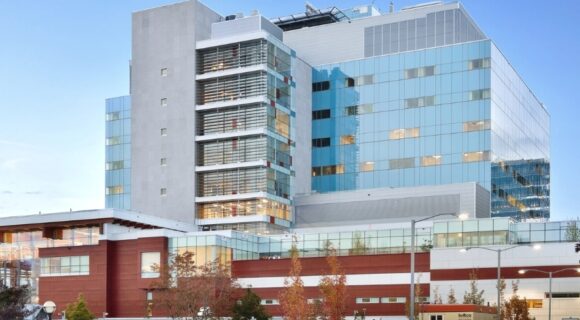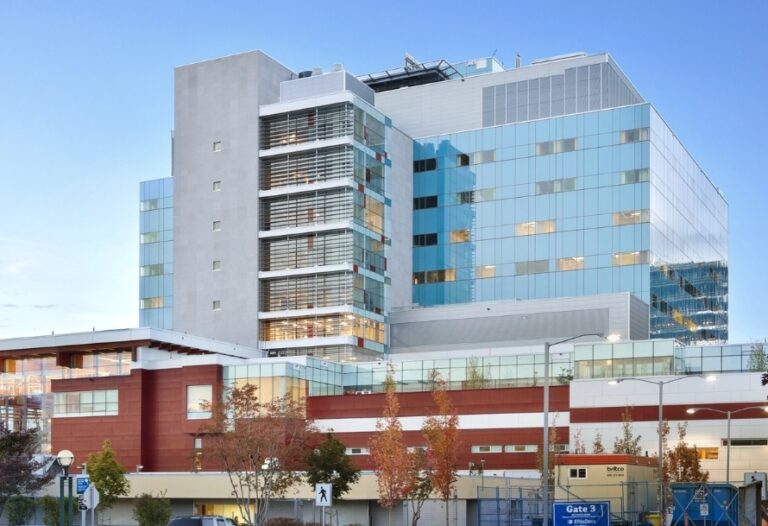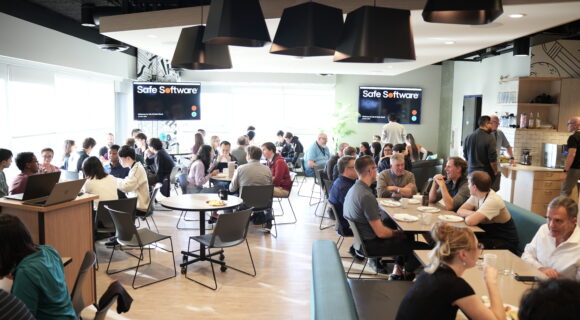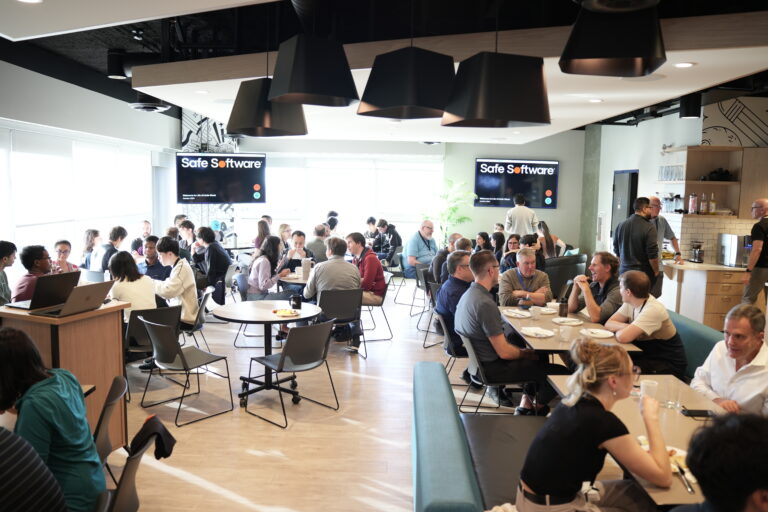Every great idea starts with a simple question: How can we make this better for our patients?
The Knowledge Translation Challenge is designed to empower health care teams to implement improvements in clinical practice that enhance patient outcomes and experiences. The program provides funding and mentorship to transform those great ideas into measurable action.
This year, three of the eight Fraser Health teams awarded the Knowledge Translation Challenge grants are from our very own Surrey Memorial Hospital. Each team received $5,000 funded by donors through Surrey Hospitals Foundation and in partnership with Michael Smith Health Research BC.
These projects are improving care experiences for women, newborns, and critically ill patients – proving donor support fuels innovation where it matters most.
Here’s a closer look at their work:
Improving comfort and communication during pelvic exams
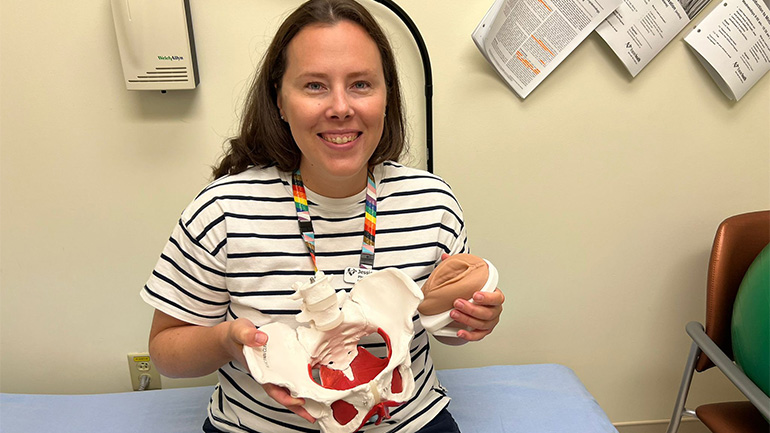
Image credit: Fraser Health
For many patients, a pelvic exam is stressful, uncomfortable, or even painful. But these exams are essential for detecting infections, cancers, and other conditions in reproductive health.
A team at Surrey Memorial Hospital, led by physiotherapist Jessica Adaszynski, alongside registered nurse Amanda Lewis, and manager of the Chronic Pain Clinic at the Jim Pattison Outpatient Care and Surgery Centre Laurie Chiesa, wanted to change the experience for patients and providers at the Family Birthing Unit by reducing pain and improving communication.
Their project includes new staff training protocols that elevate the way health care professionals perform exams with greater sensitivity and care. To help patients feel more at ease, the team also developed visual learning tools, such as a high-tech plastic pelvic model, to explain what to expect during an exam and why it’s being done.
With these changes, the team aims to provide more comfortable and supportive care for birthing parents – especially for those experiencing a pelvic exam for the first time.
To learn more about this project, click here.
Enhancing ventilator care in Surrey Memorial Hospital’s ICU
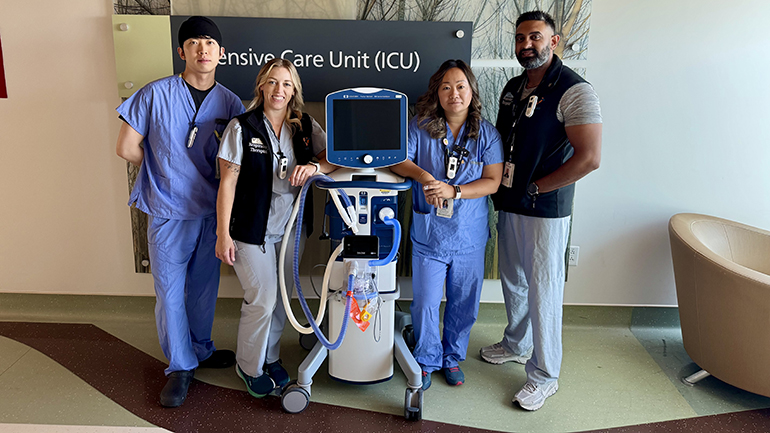
Photo (from left to right): Sung Bin Choi, ICU core respiratory therapist; Jaimie Trodden, respiratory therapy educator; Jessica Lu, regional respiratory therapy educator; Scott Mattu, respiratory therapy educator. Image credit: Fraser Health.
In the Intensive Care Unit (ICU), deciding when to remove a patient from a ventilator is one of the most critical and challenging decisions a care team makes. If a patient is extubated too early, they may need to be reintubated, which can lead to complications and longer hospital stays.
To improve outcomes for patients who rely on ventilators, a team of respiratory therapists, Jaimie Trodden, Jessica Lu, Scott Mattu, and Sung Bin Choi, developed a new approach.
Their project focuses on using advanced data already available in most modern ventilators called P0.1 monitoring. This reading helps staff better understand a patient’s drive to breathe and determine when they are truly ready to breathe independently.
With targeted training, peer coaching, and quick-reference tools, the team is making this practice part of daily care, benefiting hundreds of ICU patients every year and helping staff feel more confident in their decisions.
To learn more about this project, click here.
Supporting families with newborn nutrition at the Family Birthing Unit
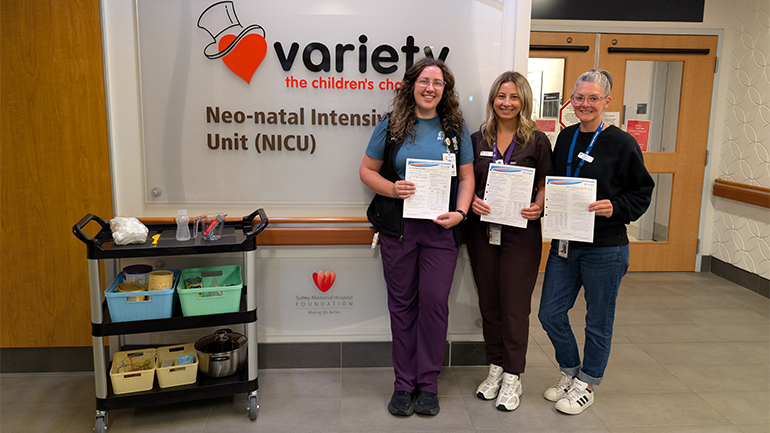
Photo from left to right: Erin Starman, pediatric dietitian; Kaila Jabs, NICU dietitian; Sara de Roy, NICU and pediatric dietitian supervisor. Image credit: Fraser Health
Bringing a newborn home is a joyful milestone, but for families whose newborns need extra nutritional support, it can also be stressful.
At Surrey Memorial Hospital, a team of dietitians, pediatric dietitian Erin Starman, NICU dietitian Kaila Jabs, NICU and pediatric dietitian supervisor Sara de Roy, and research dietitian Rebekah Sandhu set out to make that transition easier through their Fortification Enhancing Education at Discharge (FEED) project.
Some babies require fortified feeds (human milk or formula mixed with added nutrients) to help them grow and thrive. However, preparing these feeds accurately can be challenging, particularly for families who speak languages other than English or are unfamiliar with precise measuring techniques. Measurement errors for fortified feeds can affect a baby’s growth, hydration, and overall health.
This team created practical, hands-on learning tools to build families’ confidence before being discharged. A mobile teaching cart stocked with mock milk, fortification ingredients, and measuring tools allows caregivers to practice preparing fortified feeds right at the bedside. The team is also developing multilingual instructional videos that demonstrate safe mixing techniques step-by-step, making essential information accessible long after families return home.
By combining education, accessibility and cultural awareness, the FEED project is helping parents feel empowered and supported through one of the most critical stages of their baby’s care.
To learn more about this project, click here.
Donors make innovation possible
Thanks to the generosity of our donors, health care professionals across our Surrey health facilities have the resources, mentorship, and confidence to turn their incredible ideas into meaningful impact. Together, we’re shaping a future where research, collaboration, and compassion come together to deliver exceptional care for those living south of the Fraser.
